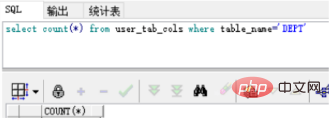How to query how many columns in oracle
In Oracle, you can use the select statement with "count(*)" to query how many columns there are in the table. The syntax is "select count(*) from user_tab_cols where table_name='table name'"; "user_tab_cols" It can also be used to query hidden columns, and the English in the table name should use uppercase letters.

The operating environment of this tutorial: Windows 10 system, Oracle version 12c, Dell G3 computer.
How to query how many columns in oracle
How many columns to query in oracle:
select count(*) from user_tab_cols where table_name='表名';
--If the table name contains English, it should be English capital letters
Examples are as follows:


Extended knowledge:
The difference between user_tab_cols and user_tab_columns in Oracle
Both tables can be used to query Table, View and Clusters under the user
Difference
-- 通过执行此SQL语句,可发现user_tab_cols还包含隐藏列,因此平时使用时推荐使用user_tab_columns select column_name from user_tab_cols where table_name = 'TEST' minus select column_name from user_tab_columns where table_name = 'TEST';
By comparing with user_tab_comments (table comments), user_col_comments ( Field comments) can basically meet general statistical needs.
How many columns can be queried by mysql:
select count(*) from information_schema.COLUMNS where table_name='表名';
--The table name can be both uppercase and lowercase
How many columns can be queried by sqlserver:
select count(*) from syscolumns s where s.id = object_id('test');
--Table names can be uppercase or lowercase
Recommended tutorial: "Oracle Video Tutorial"
The above is the detailed content of How to query how many columns in oracle. For more information, please follow other related articles on the PHP Chinese website!

Hot AI Tools

Undresser.AI Undress
AI-powered app for creating realistic nude photos

AI Clothes Remover
Online AI tool for removing clothes from photos.

Undress AI Tool
Undress images for free

Clothoff.io
AI clothes remover

AI Hentai Generator
Generate AI Hentai for free.

Hot Article

Hot Tools

Notepad++7.3.1
Easy-to-use and free code editor

SublimeText3 Chinese version
Chinese version, very easy to use

Zend Studio 13.0.1
Powerful PHP integrated development environment

Dreamweaver CS6
Visual web development tools

SublimeText3 Mac version
God-level code editing software (SublimeText3)

Hot Topics
 How long will Oracle database logs be kept?
May 10, 2024 am 03:27 AM
How long will Oracle database logs be kept?
May 10, 2024 am 03:27 AM
The retention period of Oracle database logs depends on the log type and configuration, including: Redo logs: determined by the maximum size configured with the "LOG_ARCHIVE_DEST" parameter. Archived redo logs: Determined by the maximum size configured by the "DB_RECOVERY_FILE_DEST_SIZE" parameter. Online redo logs: not archived, lost when the database is restarted, and the retention period is consistent with the instance running time. Audit log: Configured by the "AUDIT_TRAIL" parameter, retained for 30 days by default.
 Function to calculate the number of days between two dates in oracle
May 08, 2024 pm 07:45 PM
Function to calculate the number of days between two dates in oracle
May 08, 2024 pm 07:45 PM
The function in Oracle to calculate the number of days between two dates is DATEDIFF(). The specific usage is as follows: Specify the time interval unit: interval (such as day, month, year) Specify two date values: date1 and date2DATEDIFF(interval, date1, date2) Return the difference in days
 The order of the oracle database startup steps is
May 10, 2024 am 01:48 AM
The order of the oracle database startup steps is
May 10, 2024 am 01:48 AM
The Oracle database startup sequence is: 1. Check the preconditions; 2. Start the listener; 3. Start the database instance; 4. Wait for the database to open; 5. Connect to the database; 6. Verify the database status; 7. Enable the service (if necessary ); 8. Test the connection.
 How to use interval in oracle
May 08, 2024 pm 07:54 PM
How to use interval in oracle
May 08, 2024 pm 07:54 PM
The INTERVAL data type in Oracle is used to represent time intervals. The syntax is INTERVAL <precision> <unit>. You can use addition, subtraction, multiplication and division operations to operate INTERVAL, which is suitable for scenarios such as storing time data and calculating date differences.
 How to determine whether two strings are contained in oracle
May 08, 2024 pm 07:00 PM
How to determine whether two strings are contained in oracle
May 08, 2024 pm 07:00 PM
In Oracle, you can use the nested INSTR function to determine whether a string contains two substrings at the same time: when INSTR(string1, string2a) is greater than 0 and INSTR(string1, string2b) is greater than 0, it is included; otherwise, it is not included.
 How to see the number of occurrences of a certain character in Oracle
May 09, 2024 pm 09:33 PM
How to see the number of occurrences of a certain character in Oracle
May 09, 2024 pm 09:33 PM
To find the number of occurrences of a character in Oracle, perform the following steps: Get the total length of a string; Get the length of the substring in which a character occurs; Count the number of occurrences of a character by subtracting the substring length from the total length.
 Oracle database server hardware configuration requirements
May 10, 2024 am 04:00 AM
Oracle database server hardware configuration requirements
May 10, 2024 am 04:00 AM
Oracle database server hardware configuration requirements: Processor: multi-core, with a main frequency of at least 2.5 GHz. For large databases, 32 cores or more are recommended. Memory: At least 8GB for small databases, 16-64GB for medium sizes, up to 512GB or more for large databases or heavy workloads. Storage: SSD or NVMe disks, RAID arrays for redundancy and performance. Network: High-speed network (10GbE or higher), dedicated network card, low-latency network. Others: Stable power supply, redundant components, compatible operating system and software, heat dissipation and cooling system.
 How much memory does oracle require?
May 10, 2024 am 04:12 AM
How much memory does oracle require?
May 10, 2024 am 04:12 AM
The amount of memory required by Oracle depends on database size, activity level, and required performance level: for storing data buffers, index buffers, executing SQL statements, and managing the data dictionary cache. The exact amount is affected by database size, activity level, and required performance level. Best practices include setting the appropriate SGA size, sizing SGA components, using AMM, and monitoring memory usage.






